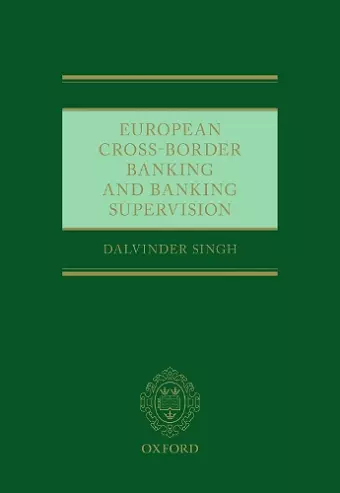European Cross-Border Banking and Banking Supervision
Format:Hardback
Publisher:Oxford University Press
Published:30th Apr '20
Currently unavailable, and unfortunately no date known when it will be back

This new work provides timely analysis of the cross-border exercise of banking activity in the EU and its supervision, from the perspective of the 'home-host rule'. It examines the current system and the efficacy of recent reforms considering whether the centralisation of decision making and a more effective mutualisation of financing tools could improve the safety and soundness of the EU banking system and reduce the asymmetry of information between home and host authorities. The EU banking market is very integrated since banking institutions based in the Union are free to perform their activities within the single market. This has allowed EU banking institutions to significantly increase their cross border operations. This way of working is based on the home country control principle according to which EU institutions performing cross border activities continue to be supervised by their home country supervisor. However, this system has raised challenges for effectively performing supervision, resolution and crisis management of banking groups operating across the borders of many different jurisdictions. This book analyses how far recent reforms under the banking union regime have addressed these issues to ensure the integrity and stability of the European integration project. It utilises data to illustrate the cross border exposures between member states and how they influence home and host decision making. But it equally explores those areas that still remain within the national discretion such as non-performing loans, insolvency-liquidation of banks and deposit protection arrangements, to mention a few. The book analyses the main pillars of the banking union: the single supervisory mechanism (SSM); and the Single Resolution Mechanism (SRM) and the proposed European Deposit Insurance Scheme (EDIS); and the related tools designed to provide crisis management under the European Stability Mechanism (ESM). As such the work considers the impact of the Single Rulebook. In considering these pieces of regulation and mechanisms the book analyses how international standards and EU requirements undertake to divide responsibilities between the home and host state and the extent to which they align interests between the home and host and minimise potential conflicts of interests. In this analysis examples from a set of EU cross-border banks are used to illustrate the workings of home and host relationship between Member States and Third Countries, and the benefits of...
An insightful read. * Prof. Seraina Grünewald, Common Market Law Review *
The book must be praised for its clear and comprehensive analysis of the home and host Member States' difficulties in critical areas of the European cross-border banking and banking supervision. It is an outstanding research work that seeks to make the reader reflect on the most salient challenges faced by regulators and supervisors when dealing with cross-border transactions and failing institutions. * Ligia Catherine Arias-Barrera, Universidad Externado de Colombia, Banking & Finance Law Review *
[T]he book is a good addition to literature on banking supervision and regulation in Europe. It is the result of well-documented research on the topic and shows a deep understanding of banking supervision. As for the readership, the book adopts a theoretical approach and would be particularly useful for scholars and students to understand the European framework on EU banking regulation in a comprehensive way, including institutional arrangements within the banking union. * Gianni Lo Schiavo, European Central Bank, Journal of International Banking Law and Regulation *
Professor Singh provides readers with a holistic and critical examination of the mechanisms of international co-operation in light of the European reforms after the financial crisis. The entire legal construction of the book is based on empirical analysis. The amount of relevant financial data gathered, interpreted and made available to the reader in order to illustrate the interconnections and cross-border exposures between Member States and how they influence home-host decision-making is huge ... Overall, the extremely profound and comprehensive analyses, based on an impressive financial data background, makes this new book an outstanding piece of scholarship and a must-read for all practitioners, academics and policymakers involved in the area of cross-border banking supervision, resolution or insolvency. * Adrian Dumitrescu-Pasecinic, West University of Timisoara, European Law Review *
This book, written by a well-known scholar and expert in banking regulation, Dalvinder Singh (The University of Warwick), is not a typical law book. It takes a holistic multidisciplinary approach and begins with the empirical overview of the cross-border banking activity within the EU, which shows considerable differences in the levels of foreign bank interconnection and concentration ... As COVID-19 rages and brings the global economy to a near standstill, banks acquire a crucial role in providing the much needed liquidity to struggling businesses. At the same time, the rising government debt, unclear prospects of economic recovery and the rapid growth of non-performing loans put the European cross-border banking, bank supervision and resolution under the spotlight, highlighting the importance of close cooperation and solidarity, and making the book by Singh particularly relevant and timely. * Ilya Kokorin, Meijers PhD Researcher and Lecturer, Leiden University, Eurofenix *
ISBN: 9780198844754
Dimensions: 255mm x 180mm x 30mm
Weight: 730g
314 pages